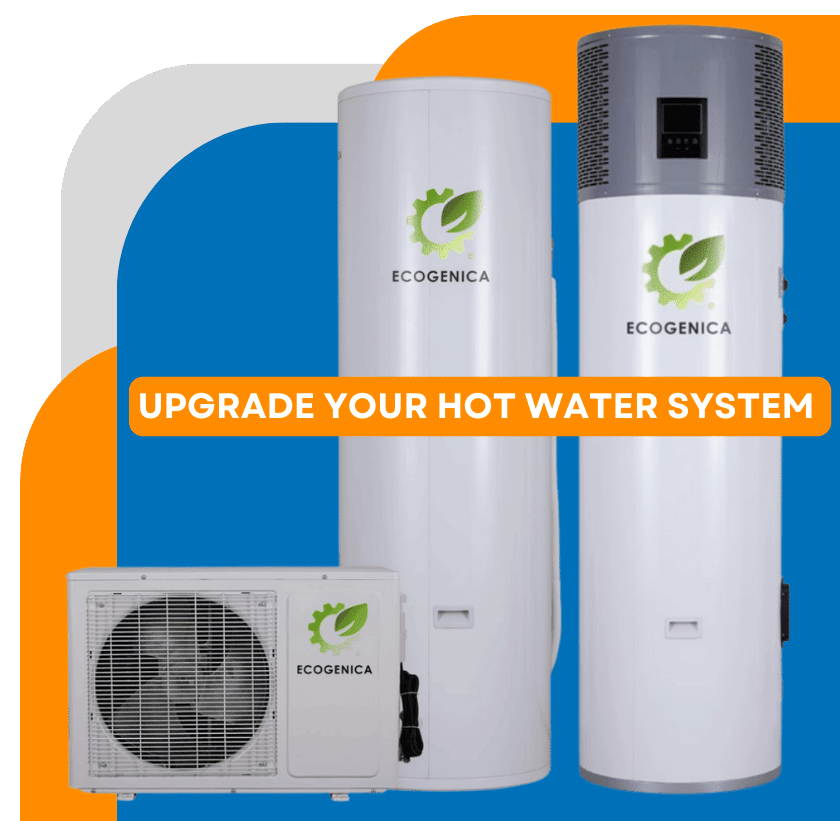What is Hot Water Heat Pump
A hot water heat pump, often referred to as a heat pump water heater (HPWH), is an energy-efficient device for heating water for household use. Instead of generating heat directly by using electric resistance elements or burning gas, a heat pump water heater moves heat from one place to another using electricity. This process is similar to how a refrigerator or air conditioner works, but in reverse.
Here’s a simplified explanation of how it works:
Heat Absorption: The heat pump system absorbs ambient air using a fan and passes it over an evaporator coil that contains a refrigerant. This refrigerant is selected for its properties of evaporating at low temperatures. As the ambient air (which can be cooler than the water but still above the refrigerant’s boiling point) passes over the evaporator, the refrigerant absorbs the heat and evaporates.
Compression: The now-gaseous refrigerant is compressed by a compressor, which increases its temperature significantly due to the compression process.
- Heat Transfer: The hot gas in the system then flows through a heat exchanger (condenser) that is in direct contact with the water tank. The heat from the refrigerant is transferred to the cold water in the tank, heating it up. As the refrigerant loses its heat, it condenses back into a liquid.


Expansion and Recirculation: The liquid refrigerant then passes through an expansion valve, reducing its pressure and temperature, and is recirculated back into the evaporator to absorb more heat from the ambient air, repeating the cycle.
The key advantage of a hot water heat pump over traditional water heaters is its efficiency. By using the heat from the ambient air, it requires significantly less electrical energy to move heat than to generate it directly. This can lead to substantial energy savings and reduced greenhouse gas emissions if the electricity is sourced from renewable energy or low-carbon sources.
Hot water heat pumps are particularly effective in moderate to warm climates where the ambient air temperature is generally above freezing. However, newer models are designed to work efficiently even in cooler climates. They are more expensive upfront than conventional water heaters but can offer lower operating costs over time due to their higher efficiency.
Heat pump hot water heaters and traditional electric resistance hot water heaters both serve the same primary function—to provide your home with hot water. However, they do so in significantly different ways and offer different benefits. Here’s a breakdown to help you understand their advantages:
Heat Pump Hot Water Heaters
Energy Efficiency:
- Heat pump water heaters use significantly less electricity compared to traditional electric water heaters. They operate by extracting heat from the air or ground (depending on the type) and using it to heat the water, which is much more energy-efficient than generating heat directly.
- They can be up to three times more energy efficient than conventional electric resistance water heaters.
Cost-Effectiveness:
- Although the initial purchase and installation costs can be higher, the operational costs of heat pump water heaters are much lower. This is due to their higher efficiency, which translates into lower energy bills over time.
- Many regions offer incentives or rebates for the installation of energy-efficient appliances like heat pump water heaters, which can help offset the initial cost.
Environmental Impact:
- By using less electricity and relying on a renewable resource (ambient heat), heat pump water heaters have a lower carbon footprint.
- Reduces the demand on the electrical grid, particularly during peak times if the unit is run predominantly at night or during off-peak hours.
Longevity and Durability:
- Heat pump water heaters typically have a longer lifespan compared to traditional electric heaters because they have fewer mechanical parts that heat up, potentially leading to less wear over time.
Electric Resistance Water Heaters
Simplicity and Reliability:
- Electric water heaters are simple in design and widely used, making them a well-understood and reliable option.
- They have fewer moving parts than heat pump water heaters, which can translate to fewer mechanical issues and maintenance requirements.
Installation:
- Generally cheaper and easier to install compared to heat pump water heaters. They don’t require any specific ventilation or space other than a standard water connection and electrical supply.
- They can be installed in a variety of locations including tight spaces without worrying about air circulation.
Performance in Cold Climates:
- Electric heaters are less affected by the surrounding air temperature, so their performance remains stable regardless of the climate.
- Heat pump water heaters might experience reduced efficiency in very cold climates because they rely on extracting heat from the air.
Cost:
- The upfront cost for an electric water heater is typically lower than for a heat pump water heater.
- Suitable for areas where electricity costs are low, making the higher efficiency of heat pumps less beneficial.
Conclusion
Choosing between a heat pump hot water heater and an electric resistance water heater largely depends on your specific needs, local climate, and electricity costs. If you’re looking for long-term savings and environmental benefits, and if the local climate supports efficient operation, a heat pump water heater could be the better choice. Conversely, if initial costs are a major concern, or if you live in a very cold area, a traditional electric water heater might be more suitable.
